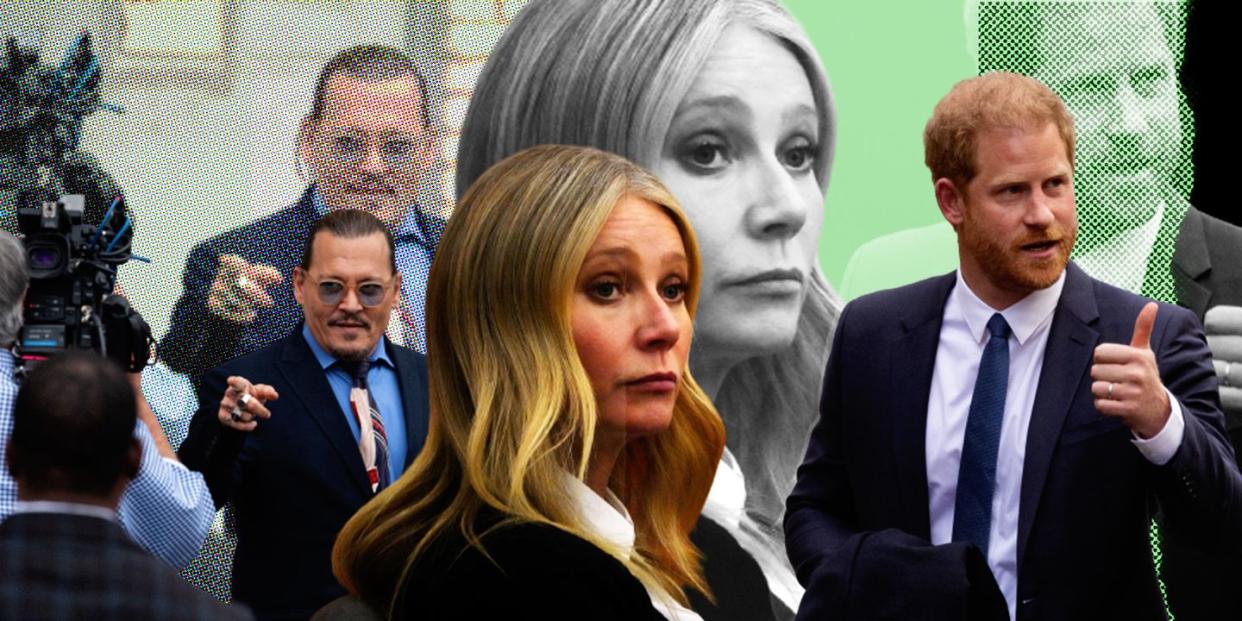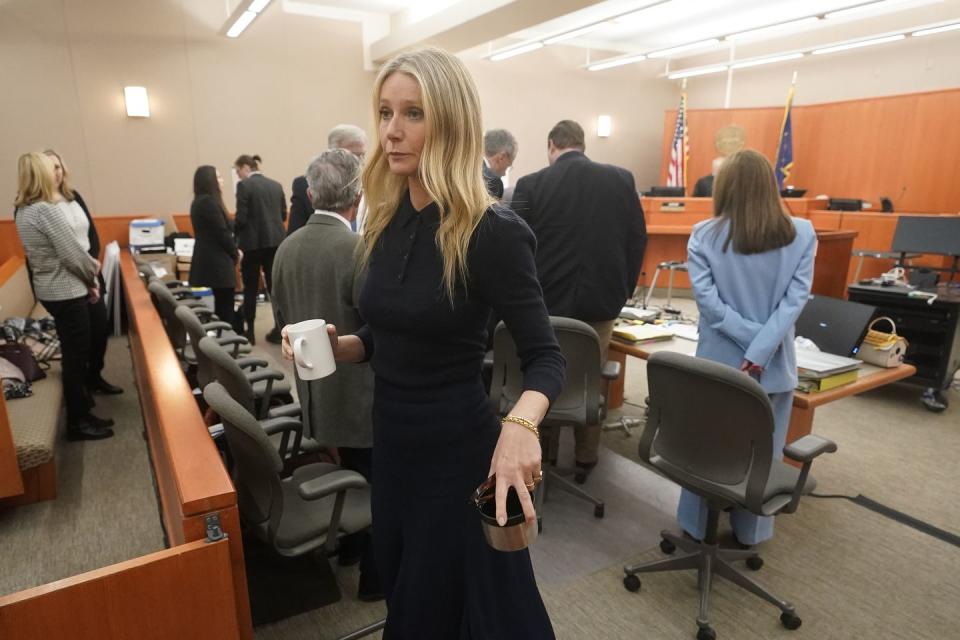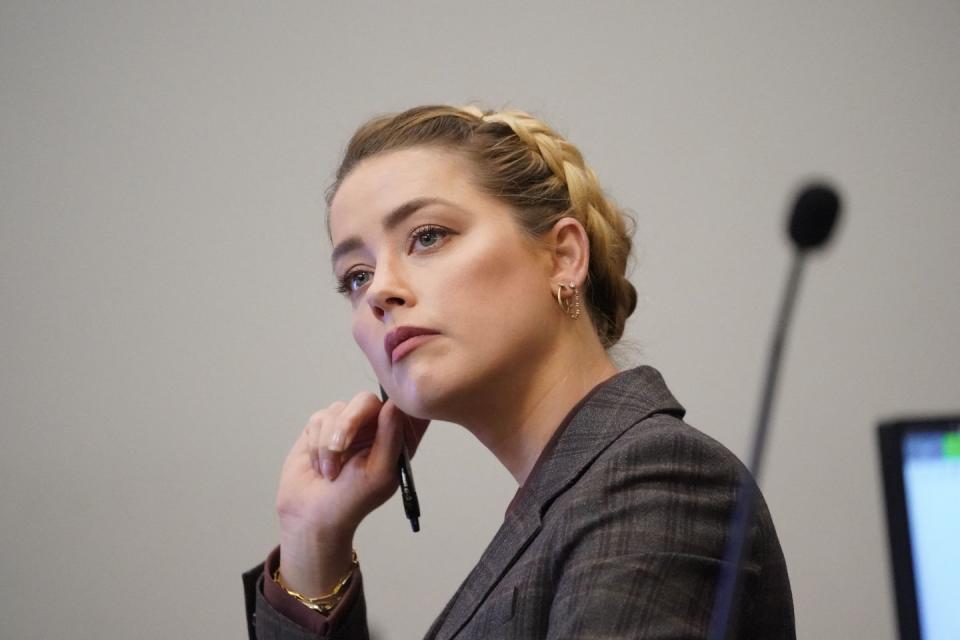Celebrity court cases have become our new favourite reality show

- Oops!Something went wrong.Please try again later.
- Oops!Something went wrong.Please try again later.
- Oops!Something went wrong.Please try again later.
Yesterday saw a suited-and-booted Prince Harry give a thumbs up to photographers, who swarmed him like a gaggle of millennials who've just spotted a sign for bottomless brunch, as he entered the Royal Courts of Justice – ready to wage war against Associated Newspapers Limited (ANL). He, and others such as Elton John, are suing the media group over alleged unlawful information-gathering at its titles.
The images of the royal arrived after a weekend where Twitter was flooded with memes about 'losing half a day of skiing', thanks to Gwyneth Paltrow's ongoing court case that sees her accused of recklessly crashing into a retired optometrist during a Utah ski trip back in 2016. Something he claims resulted in life-changing injuries, that he's hoping a win of £244,000 will help soothe. Paltrow is counter-suing for a 'symbolic' $1 and denies being at fault.
But neither of these cases can compare with the frothing, fever and furore that Johnny Depp's efforts to sue ex-wife Amber Heard for defamation drew last summer. I remember a friend of mine saying, a few weeks in, that she'd gotten into the habit of rushing home from work, ordering a takeout and watching the livestream of witnesses and experts testifying on YouTube – treating the entire spectacle almost like a reality show, rather than one person's efforts to destroy and publicly humiliate another. It became water-cooler fodder, with everyone having an opinion that they felt comfortable enough to share in the same way they would discussing Love Island, despite the fact that several UK judges had already found it to be 'substantially true' that Depp had abused Heard on numerous occasions.
But what does it say about our collective as a society, the way we're normalising turning pain into memes? Let's not forget Wagatha Christie either, which even spawned its own musical, despite the fact that Rebekah Vardy's agent was left suicidal by the ordeal. Should we all be taking a step back to assess our behaviour, rather than continue feasting joyously on the bodies of slain celebrity deers... or are they fair game simply because they're public figures with money in the bank and gossiping gives us a kick? (And I ask this as someone who truly does love a gossip sesh)
And what impact does us having our noses pushed up against the glass, breathing heavily, have on the cases themselves?

Whilst it may feel like things have ramped up in the world of Hollywood cases of late, this type of circus has actually been playing out for almost 100 years, says LA-based lawyer, Mike Mandell, who you may know better as @LawByMike. "The first American celebrity trial was in the 1920s with Fatty Arbuckle [a silent movie star who was accused, and later acquitted, of rape and murder], arguably that's when the obsession began. But the true starting point, in my opinion, began with the O.J. Simpson trial."
Mandell points out that, as per Times Magazine, "more than 150 million viewers — 57% of America — tuned in to watch the verdict at 10 a.m. on 8 October 1995", his eight-year-old self included. And it went on to spawn multiple TV dramas, documentaries, podcasts and more. At the centre of the case, but often forgotten, were the lives lost.
So, is this on-tap access to 'justice' really a good thing? "There are arguments on both sides," Mandell explains. "Proponents argue that the public has a right to know and that cameras in the courtroom lead to more transparency and accountability. Opponents argue that it creates distraction, influences jurors and witnesses, and causes everyone in the courtroom (judges, lawyers, witnesses, jurors, and the parties) to behave differently." (See: when Paltrow shared that she's 5 foot 10, a member of the opposing legal team exclaimed she was "so jealous!" and proceeded to ramble on about how she herself "needs to wear four inch heels just to make it to 5 foot 5". Objection, your honour! Relevance?)
However, Mandell doesn't believe having a case live-streamed should impact how a lawyer performs, explaining that "a lawyer's goal is always to 'win' for their client, and they will use all permissible tools available to them, including putting on a show, with or without cameras."
But social media's part in all this cannot be ignored either, he adds. "[In the case of Depp v Heard] it took social media by storm, and while the jurors were instructed to avoid consuming media coverage of the trial, most of us would agree that was a near-impossible task. We can't say for sure [if social media swayed jurors], but we can agree that without cameras in the courtroom, there would have been less online commentary and thus, far less opportunity for outside influence on the jurors."
As for what drives the desire to be onlookers during traumatic times for celebrities, the psychology is pretty simple, says clinical psychologist Lauren Steingold, who can be found via Therapy Finders. In fact, she says, it can be surmised in three words: eat the rich.
"Part of our fascination with these trials is because these people are so familiar to us that it feels as if we really do know them and so naturally we're curious about what's going on in their lives," Steingold theorises. "But there's another side to our obsession with celebrity trials and it has to do with the 'eat the rich' concept. Whilst the term was first used during the French Revolution to denote anti-capitalism, nowadays the term signifies the desire of everyday people to see the rich and famous get their just desserts. There's something very satisfying about knowing even rich, famous and beautiful people experience problems."
She points to the ever-expanding chasm between social classes as a key driver for our newly heightened love of watching criminal and civil cases involving big names play out. "In the last few years, [many of] the richest people on the planet have doubled or tripled their net worth, whilst others experience ever greater financial and social difficulties. Is it really a surprise that people are enjoying seeing those that represent the top 1% go through their fair share of difficulties?"
As for the meme-ification of it all, Steingold says it may be "rooted in the fact that making ourselves feel better, by making fun of someone else, is a common defence mechanism against feelings of inadequacy", or link back to our desperation to be seen as being on 'the right side of history', and also points out the risk it carries when it comes to dehumanising people. In some cases, the social media onslaught is so brutal it can feel like a continuation of the alleged abuse being debated in court.

Often, whether we like it or not, what's highlighted through a celebrity example is a reflection of our interactions with 'normal' people too. What starts (and is normalised) with the stars, often ends with us. Think about it, high-profile revenge porn cases involving the likes of Pamela Anderson set the tone for others to commit similar crimes against everyday women on a mass scale, something that sparked the image-based abuse epidemic we're now trying to control. Since Depp v Heard, legal experts are warning of a rise in threats of litigation against women who've spoken out about abuse too. Hollywood's influence on our daily lives is undeniable.
And it seems that our insatiable appetite for access to high-profile cases will only continue to be catered to moving forwards. "The continued trend of televising celebrity cases in the United States has even led to new efforts to put an end to the longstanding traditions of not allowing cameras inside the highest court in the land, the U.S. Supreme Court," says Mandell. "Recently, a bipartisan group of senators introduced a bill that would finally allow cases before the Supreme Court to be televised. The senators claim that not only would this make the judiciary more transparent but that it would provide better education into how the courts operate." It also, some might say, hammers a final nail into the coffin of privacy.
While some could feel they're merely supporting someone's quest for justice, the way in which the public engages in celebrity court cases has already resulted in real-life consequences – and not just for the people directly involved. So, will this obsession with celeb trials turned reality TV ever stop?
Follow Jennifer on Instagram and Twitter
You Might Also Like

